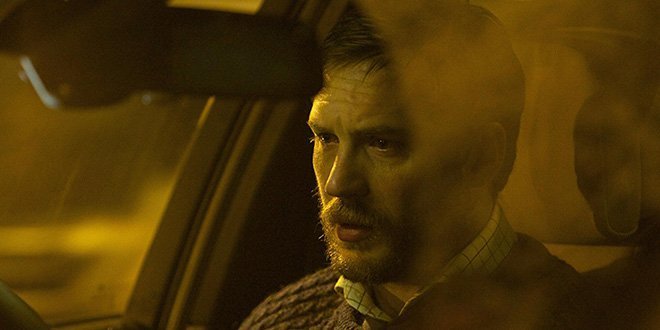While Tom Hardy is probably best known for his performance as criminal mastermind Bane in The Dark Knight Rises, his appearance in big summer blockbusters has not diminished his passion for working on smaller projects. The latest of those is Locke, an experimental bit of filmmaking that takes place in real time, as a construction worker drives across London, communicating with colleagues and family members via a Bluetooth connection while his professional and personal life begin to fall apart.
Written and directed by Steven Knight, Locke takes place almost exclusively in the confines of the protagonist’s vehicle. While this may sound less than exciting, Hardy’s restrained, emotional performance combines with superbly-written dialogue and a camera that’s always in motion to create a mesmerizing experience.
Locke was recently selected as the opening film of the 2014 Phoenix Film Festival, and we were lucky enough to sit down with Knight the following morning to discuss his work on the project.
_____________________________________________________________________________________
With the exception of the opening and closing shots, the entire film takes place in and around a car, yet you manage to keep the audience engaged because the camera is constantly moving. Was there a lot of storyboarding in pre-production?
The whole thing was done in a very different way to how things are normally done. We shot the whole thing for real – in other words, we shot the whole film twice a night, beginning to end, in sequence. We put three cameras in the car each night, I would say “action” and we’d set off.
The other actors were in a conference room in a hotel near the motorway, with a real phone line open to the car. I would cue the actors to make the call, and Tom had auto-cues in front of him in the rearview mirror and the GPS system, so the script was always there for him. We would just set off and go, and every 27 minutes we had to pull over because the memory card in the camera lasts for 30 minutes, so we’d pull over, change the memory card, change the angles, change the lenses, and set off again.
Since we shot the whole thing all the way through probably 16 times, we always had options in terms of angle, lens, and style of shot for every moment. We didn’t worry about continuity of the background, we just shot it as if it were a play, and so it just meant we had lots of options when it came to the edit.
Why did you decide to approach the film in such a unique way?
Well, I had just made a film in the conventional way, with Jason Statham. I just wondered if there were other ways of doing the same thing, of getting people into a room and turning the lights off, getting them to look at the screen for 90 minutes and engage with the character. And I thought, is it possible to just shoot something all the way from beginning to end and just see what happens, and worry about the edit later?
What about the inspiration for the story itself, and the character’s background as a concrete foreman?
When I was younger I worked on building sites for awhile, and I remembered that when the concrete arrives, it’s a big thing. It’s got to be dealt with, there are millions and millions of dollars at stake. And I just wanted to dramatize what are considered to be ordinary lives and ordinary jobs. Within them are huge dramas for the people involved, and I wanted to sort of do justice to that.
Did you write the screenplay with Tom Hardy in mind for the lead?
Oh yeah. I had the idea of doing this, but I hadn’t written the screenplay yet, and I thought if we’re going to have someone onscreen for 90 minutes, they’d better be good. I was meeting Tom Hardy about something else anyway, and I put the idea to him about doing a play, effectively, and shooting in the way that I thought. He loves theater, so he was in.
Was there any particular decision behind having him use a Welsh accent for the film?
What we wanted was a British working class accent. Most of the accents around London, Birmingham, Liverpool, they come with some baggage, there’s a sort of characteristic to each of those things. Welsh is a working class accent, but it’s a bit more neutral. Also, Tom has a good friend who is Welsh.
Before directing Locke, you had written a couple of films that were very well-received. Do you prefer to write and direct your own material, or are you interested in directing someone else’s work someday?
I can’t envision a time when I would direct someone else’s writing. I consider writing to be the day job, where I write for sort of Hollywood projects. Credited or not credited, that’s what I do for a living. But something like this, I write for myself to direct, and I know that I’m going to direct it in advance. I much prefer to write and direct, but writing is the thing that pays the bills.
So you basically save all the good stuff for yourself?
No, that’s exactly what I’m trying not to say! [laughs] No, but it’s a different discipline. If you’re doing a big budget film, it’s totally different, you’ve got much more liberty to do things. It’s a different area of one’s brain.
You mentioned meeting with Tom about something else, originally. Is there another project in the works?
There is, yeah. We’re hoping to do a project at the end of this year which I’ll direct, and which will, again, be pretty experimental. I think we’re like minds, I think we’ll work together quite a bit.
_____________________________________________________________________________________
Locke is currently playing in limited release.




